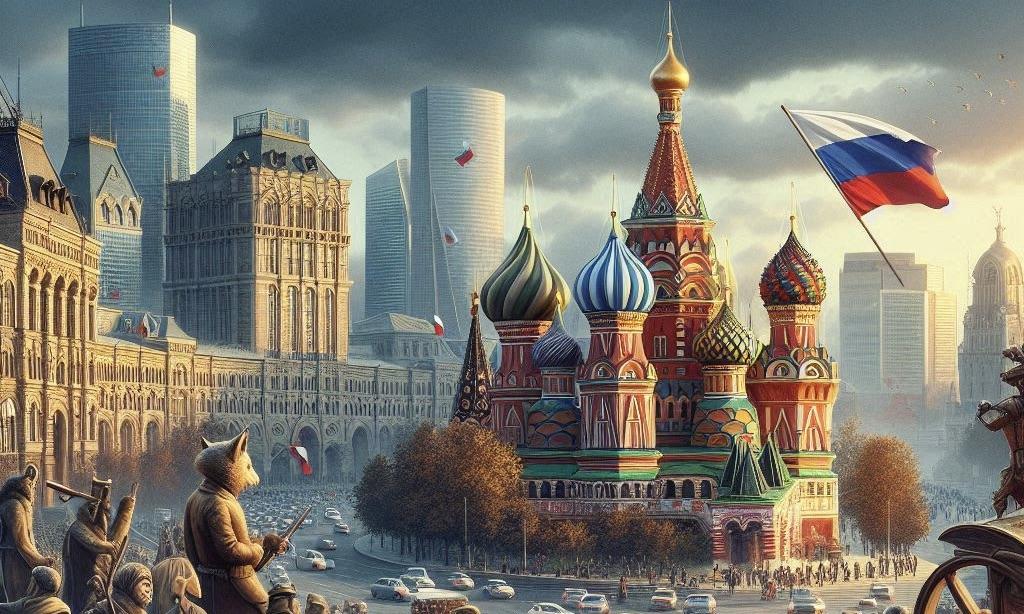Russia's central bank is set to raise its key interest rate by 200 basis points to 18% on July 26, according to a Reuters poll. The move aims to combat soaring inflation, currently at 9.2%, and cool the overheated economy.
Russian Central Bank Expected to Hike Interest Rates by 200 Basis Points to Combat Inflation
According to a Reuters poll on July 22, the Russian central bank is expected to increase its key interest rate by 200 basis points to 18% at the July 26 board meeting to alleviate inflation and calm the overheated economy.
Inflation is currently at 9.2%, significantly higher than the regulator's target of 4%. Numerous factors contribute to this, including acute labor shortages, massive state expenditures, wage growth across all sectors, and the ongoing expansion of corporate and retail lending.
All 28 analysts in the survey concurred that the rate hike was unavoidable. Three-quarters of the analysts queried anticipated a 200-basis-point increase, while only four analysts perceived the likelihood of a 100-basis-point increase.
"There are no alternatives to the rate hike at the July 26 meeting," said Oleg Kuzmin from Renaissance.
In the previously conducted Reuters poll on July 2, 10 out of 16 analysts anticipated the 200-basis-point increase. Since then, confident analysts have increased their projections based on the most recent inflation data.
"We have raised to 18% taking into account the latest data," said Sofya Donets from T-Bank.
The central bank argues that tight monetary policy will help reduce inflation to the target of 4%.
"High lending growth is a concern for the central bank, which is trying to cool down demand with high interest rates. However, it has not succeeded so far," Finam analysts wrote.
Industry Leaders Criticize Central Bank's Tight Monetary Policy as Growth Slows Amid Defense Spending
Industry lobbyists and bankers accuse the central bank of stifling economic development when the economy, driven by defense sector spending, is capable of growing at a rate higher than the current 5%.
The regulator's rhetoric has become more caustic in the lead-up to the July 26 meeting. The governor, Elvira Nabiullina, has indicated that the board will prioritize the magnitude of a rate increase over its necessity.
The central bank previously stated that a more sustainable approach to inflation management necessitates the implementation of a strict monetary policy for a significantly longer duration than had been anticipated.
Also anticipated is an evaluation of the regulator's inflation forecast for this year, which is currently estimated to be between 4.3 and 4.8%. Some analysts have noted that inflation is currently at a zenith of over 9% and will decrease to 7% by the end of the year.



 Gold Prices Rally in February as Geopolitical Risks and Economic Uncertainty Boost Safe-Haven Demand
Gold Prices Rally in February as Geopolitical Risks and Economic Uncertainty Boost Safe-Haven Demand  Oil Prices Steady as US-Iran Nuclear Talks and Rising Crude Inventories Shape Market Outlook
Oil Prices Steady as US-Iran Nuclear Talks and Rising Crude Inventories Shape Market Outlook  Dominican Republic Unveils Massive Rare Earth Deposits to Boost High-Tech and Energy Sectors
Dominican Republic Unveils Massive Rare Earth Deposits to Boost High-Tech and Energy Sectors  Tokyo Core Inflation Slows Below 2%, Complicating BOJ Rate Hike Outlook
Tokyo Core Inflation Slows Below 2%, Complicating BOJ Rate Hike Outlook  PBOC Scraps FX Risk Reserves to Curb Rapid Yuan Appreciation
PBOC Scraps FX Risk Reserves to Curb Rapid Yuan Appreciation  USITC to Review Impact of Revoking China’s PNTR Status, Potentially Raising Tariffs on Chinese Imports
USITC to Review Impact of Revoking China’s PNTR Status, Potentially Raising Tariffs on Chinese Imports  Gold Prices Steady in Asia, Set for Strong February Gains on Safe-Haven Demand
Gold Prices Steady in Asia, Set for Strong February Gains on Safe-Haven Demand  BOJ Signals Possible April Rate Hike as Ueda Eyes Inflation and Wage Growth Data
BOJ Signals Possible April Rate Hike as Ueda Eyes Inflation and Wage Growth Data  IMF Urges U.S. to Cut Fiscal Deficit to Reduce Trade and Current Account Gaps
IMF Urges U.S. to Cut Fiscal Deficit to Reduce Trade and Current Account Gaps  U.S.-Canada Trade Talks Resume as Trump Administration Reviews USMCA
U.S.-Canada Trade Talks Resume as Trump Administration Reviews USMCA  U.S. Stock Futures Fall as Nvidia Drops Despite Strong Earnings; Netflix Jumps 9%
U.S. Stock Futures Fall as Nvidia Drops Despite Strong Earnings; Netflix Jumps 9%  Strait of Hormuz Oil and LNG Shipments Disrupted After U.S.-Israel Strikes on Iran
Strait of Hormuz Oil and LNG Shipments Disrupted After U.S.-Israel Strikes on Iran  Stock Market Movers: Dell, Block, Duolingo, Zscaler, CoreWeave, Autodesk, Rocket, MARA
Stock Market Movers: Dell, Block, Duolingo, Zscaler, CoreWeave, Autodesk, Rocket, MARA  U.S. Stocks Close Lower as Hot PPI Data, Nvidia Slide Weigh on Wall Street
U.S. Stocks Close Lower as Hot PPI Data, Nvidia Slide Weigh on Wall Street  Ecuador Raises Tariffs on Colombian Imports to 50% Amid Border Security Dispute
Ecuador Raises Tariffs on Colombian Imports to 50% Amid Border Security Dispute 































